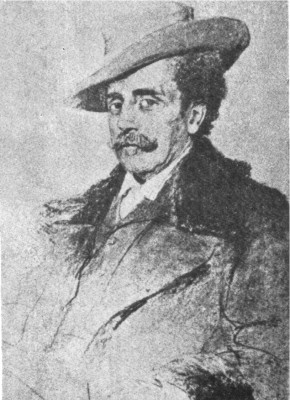- Antonio Labriola
Infobox Philosopher
region = Italian philosophy
era =19th century philosophy
color = lightsteelblue
image_size = 200px
image_caption =
name = Antonio Labriola
birth = birth date|1843|07|02|df=y
death = death date and age|1904|02|12|1843|07|02
school_tradition =Marxism
main_interests =
notable_ideas =
influences = Hegel, Herbart
influenced =Benedetto Croce ,Antonio Gramsci
box_width = 26emAntonio Labriola (
July 2 ,1843 -February 12 ,1904 ) was an Italian Marxist theoretician. Although anacademic philosopher and never an active member of any Marxist political party, his thought exerted influence on many political theorists in Italy during the early 20th century, including the founder of the Italian Liberal PartyBenedetto Croce and one of the leaders of theItalian Communist Party Antonio Gramsci .Biography
Labriola was born in Cassino (then in the
Papal States ), the son a schoolteacher. In 1861, he entered theUniversity of Naples . Upon graduating, he remained inNaples and became a schoolteacher. During this period, he pursued an interest in philosophy,history andethnography . The early 1870s saw Labriola take upjournalism and his writings from this time express liberal and anticlerical views.In 1874, Labriola was appointed as a
professor inRome , where he was to spend the rest of his life teaching, writing and debating. Although he had been critical of liberalism since 1873, his move towards Marxism was gradual, and he did not explicitly express a socialist viewpoint until 1889. He died in Rome on2 February 1904 . [cite web| url=http://www.cultureducazione.it/antoniolabriola/cartearchivio.htm |title=Antonio Labriola e la sua Università]Thought
Heavily influenced by
Georg Wilhelm Friedrich Hegel andJohann Friedrich Herbart , Labriola's approach to Marxist theory was more open-ended than the orthodoxy of theorists such asKarl Kautsky . He saw Marxism not as a final, self-sufficient schematisation of history, but rather as a collection of pointers to the understanding of human affairs.It was necessary that these pointers be somewhat imprecise if Marxism was to take into account the complicated social processes and variety of forces at work in history. Marxism was to be understood as a "critical theory", in the sense that it sees no truths as everlasting, and was ready to drop its own ideas if experience should so dictate. His description of Marxism as a "philosophy of praxis" would appear again in Gramsci's "
Prison Notebooks ".References
External links
* [http://www.marxists.org/archive/labriola/index.htm "Antonio Labriola Archive"] at
Marxists Internet Archive Persondata
NAME=Labriola, Antonio
ALTERNATIVE NAMES=
SHORT DESCRIPTION=Philosopher and Marxist thinker
DATE OF BIRTH=1843-07-02
PLACE OF BIRTH=Cassino
DATE OF DEATH=1904-02-12
PLACE OF DEATH=Rome
Wikimedia Foundation. 2010.
